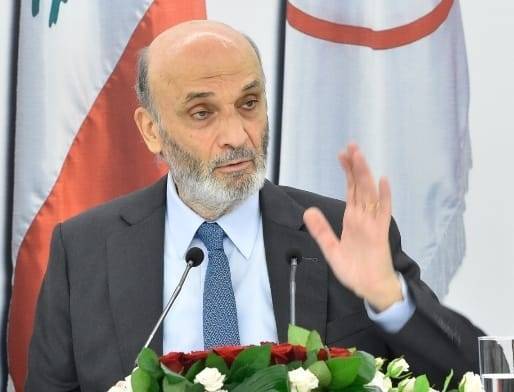
Lebanese Forces leader Samir Geagea. (Credit: provided by LF)
BEIRUT — At a press conference on Friday, Lebanese Forces (LF) leader Samir Geagea welcomed the extension General Joseph Aoun's term as commander-in-chief of the Lebanese Army. Aoun was due to retire on Jan. 10.
Meeting on Friday, Parliament approved a one-year postponement of the retirement of the generals in charge of security services, including General Aoun. This decision applies de facto to Director General of the Internal Security Forces General Imad Osman, who is due to step down next May.
"I'll be going into the holiday season with a clear conscience, having extended the mandates of the only two institutions that were still standing despite the crisis," said Geagea. The battle to obtain this extension, waged primarily by the FL, was neither for nor against anyone, he added.
The LF expressed their determination extend General Aoun's term of office through Parliament. They succeeded in obtaining an important commitment from Speaker of Parliament Nabih Berri, according to which Parliament would meet after a Council of Ministers session initially scheduled for midday on Friday. The commitment ensured that Parliament could vote on a bill extending the mandate of the most senior military official regardless of the outcome of the outgoing government's Friday meeting. The ministerial session was eventually postponed to Tuesday, Dec. 19 at 9:30 a.m. for lack of a quorum.
Samir Geagea also criticized the fact that the speaker of Parliament had passed several bills during the plenary sessions on Thursday and Friday. "This time we let it pass, although Nabih Berri took the opportunity to have 18 bills examined," said the LF leader. He therefore invited the head of the legislative body "to go all the way by calling for a session" to elect a new President of the Republic.
Lebanon has been without a head of state since Oct. 31, 2022, following the end of Michel Aoun's term of office. According to the Constitution, Parliament should only meet as an electoral college to choose a new president. Except that President Berri uses his jurisprudence to convene Parliament and legislate on so-called urgent matters, according to what he calls "legislation of necessity," a concept criticized by many jurists and politicians as being contrary to the Constitution.
Twelve parliamentary sessions have been devoted to the election of a President of the Republic since September 2022, but they have all failed, due to a lack of political agreement.